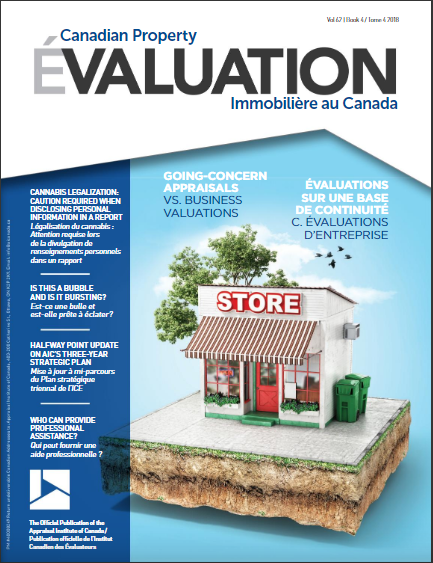Cannabis legalization: Caution required when disclosing personal information in a report
Canadian Property Valuation Magazine
Search the Library Online
Cannabis legalization
Caution required when disclosing personal information in a report
With the recent implementation of cannabis legalization in Canada, Appraisal Institute of Canada (AIC) Members must be aware of their obligations and responsibilities under the Canadian Uniform Standards of Professional Appraisal Practice (CUSPAP) and the Personal Information Protection and Electronic Documents Act (PIPEDA) regarding disclosure of an owner/occupant’s personal information in a report.
CUSPAP requires Members to disclose any and all concerns revealed during an inspection or through research about a property that may affect its value.
Where an aspect of a property is beyond the scope of their expertise, Members:
- should recommend the appropriate professional to provide an opinion and recommendation on that aspect of the property; and
- must invoke appropriate hypothetical conditions, assumptions and/or limiting conditions in a report (https://www.aicanada.ca/members-home/professional-practice-resources/forms-templates); or
- should decline the assignment.
Members cannot be expected to be experts on the cultivation of cannabis, just as they are not expected to be experts in surveying, structural integrity, etc. Members are, however, the eyes and ears of their clients and are required to disclose anything they have observed about a property that affects the value of that property. Members are not responsible for reporting on whether cannabis plants are legal or illegal. It is also a Member’s own decision to report any unusual, or potentially criminal, activity to legal authorities. A Member should use both caution and discretion and seek legal advice before deciding to make a report to legal authorities.
The cultivation of cannabis plants is considered to be personal information about the owner/occupant and, as such, a Member must be careful about disclosing information about cannabis plants found in/on a property.
The existence of the plants alone is not to be considered a detrimental condition and is not disclosable, but the existence of detrimental conditions that may be a result of the cultivation of the plants should be documented – this would include disclosing evidence of mould, water damage, excess humidity, odours, or modifications to ducts, vents, wiring, etc. observed during an inspection.
PIPEDA requires a Member to obtain consent from the owner/occupant before taking photographs of a property. This could include photographs of anything in or on the property that would be considered a personal and/or identifiable item. AIC has developed a consent form that can be accessed at: (https://www.aicanada.ca/members-home/professional-practice-resources/forms-templates). The consent form has been developed to provide key guidelines to the appraiser for obtaining written consent and information for the owner/occupant. Using the AIC consent form is not mandatory, however, obtaining consent to take photographs is. The appraiser will want to document that consent was obtained and if the form is signed, keep a copy in the work file.
Even with consent, a Member should only photograph a cannabis plant to document the existence of a detrimental condition that may be a result of the cultivation of the plant. It is important to remember that the purposes for which an appraiser collects and uses personal information must be appropriate and defined. Privacy laws require organizations to limit collection, use and disclosure of personal information to purposes that a reasonable person would consider appropriate under the circumstances. In other words, consent is not a free pass for Members to collect and use personal information indiscriminately for whatever purpose they choose. If a client requires photographs of a property, the Member can provide a copy of the AIC Consent Form to the client.
This should cause the client to:
- inform the owner/occupant of the property that they require photographs; and
- seek the owner/occupant’s consent to:
- take photographs of the property;
- use those photographs in a report; and
- disclose those photographs to any/all parties with whom the report may potentially be shared.
If the client fails to obtain consent before the inspection, the Member will need to obtain consent from the owner/occupant at the outset of the inspection and before photographs of a property are taken and/or used. However, it is highly recommended that the client provide the Member with the signed consent form before making an appointment for the inspection





